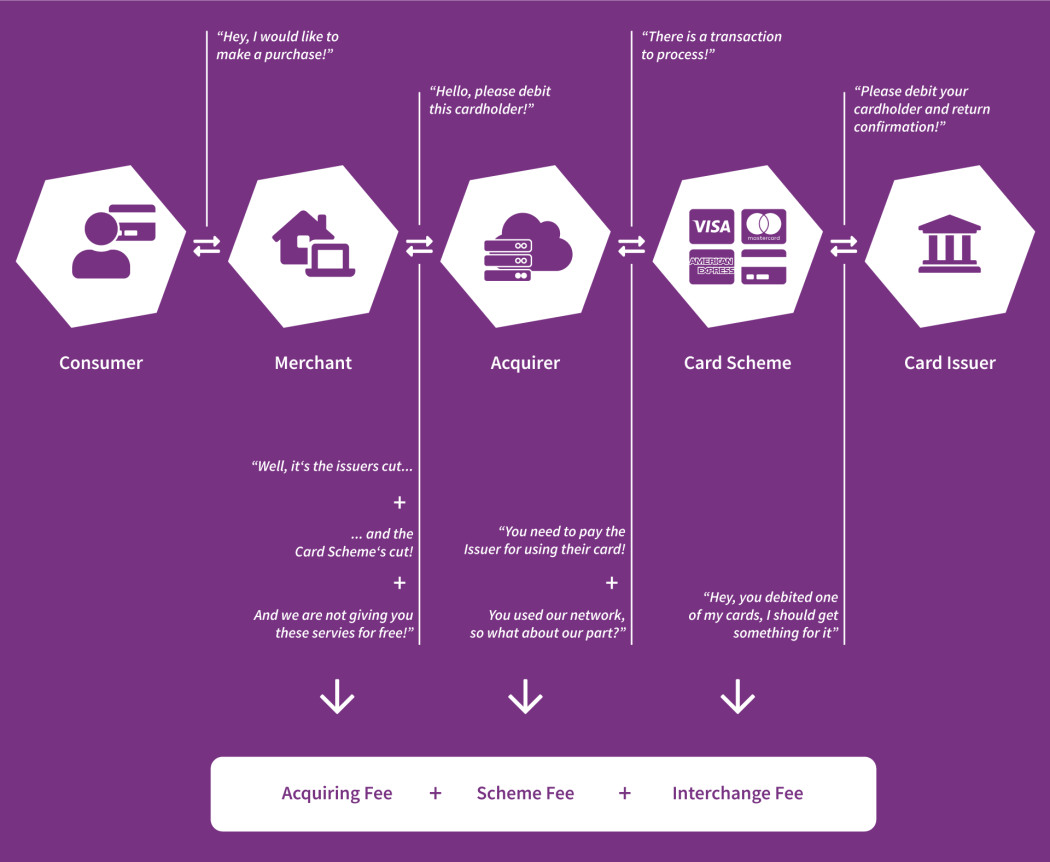Whatever you are selling and wherever you are selling it, credit and debit cards probably make up a significant proportion of your payments. That is why we have put together this explainer article which will guide you through all the components that make up a card processing fee as well as what you can do to ensure you are getting the best rates for your business.
What credit card processing fees will I be charged?
When processing a transaction via a credit card you will be deducted three fees:
The processing fee: charged by your acquirer or payments provider for processing the transaction.
The card scheme fee: charged by the relevant card scheme (Visa, Mastercard, AMEX…).
And finally Interchange: charged by the customer’s issuing bank; normally the largest cut.
The first two are pretty self explanatory as this is how the card schemes and the payment service providers make their money. However, these fees can fluctuate depending on geolocation, business model (high/low risk), card used, and acquirer (if you are using a multi-acquirer set-up.). But what is Interchange? And what types of Interchange fees are there? That is a question which doesn’t have a short answer.
How are Interchange fees calculated?
Interchange fees come into play whenever a merchant accepts a payment via a debit or credit card. This fee is to cover the “fraud or bad debt” that happens when approving payments (the money banks lose when payments don’t go to plan). These fees are agreed and collected by the card network and then given to the issuing bank (the bank that issued the credit card to the cardholder). Not only are they the biggest expense but they are also a logistical puzzle. The structure and fees vary from market to market and from card type (consumer debit, commercial, prepaid, you get the idea). They also have a habit of changing.
Visa publishes their current rates here, and Mastercard here.
What Factors Can Impact The Fees You Pay?
There are many things that can influence how much you pay. Below is a breakdown of what has an impact on the credit card fees.
The Processing Method: card-present transactions have a lower rate than card-not-present.
The Data Submitted with the Transaction: the more secure the transaction (e.g. by applying 3DS), the lower the rate.
The Merchant Category Code: some MCCs have specific interchange categories.
The Card Type: the type of card will influence the rate. The highest to lowest interchange fees are as follows: premium credit cards, standard credit cards, signature debit cards, PIN debit cards.
The Card Brand: specialty card offers, like rewards, can impact the interchange rate.
The Card Owner: the interchange rate is influenced by the card owner, whether that is an individual, business, corporation or municipal agency.
In the past there has been little to no transparency on how the fees were calculated and with cards being such an important part of the online purchasing ecosystem merchants were at the mercy of the banks. However things have improved and an effort to standardize interchange, within the EU, has come into action.
What is Interchange++ (IC++)?
Since 2015 Interchange++ has come into play, with the final measures put in place in 2016. This system offers a much more transparent billing structure which is based on a pricing model that tracks interchange rates; it includes the interchange fee, the card scheme/card associations fee (first +) and the processing fee (second +).
With IC++, a merchant can see the separation between the interchange fee charged by the issuing bank and the mark-up charged by the payment processor. This transparency encourages a competitive fee from the payment processor. For example, the fee cap across Europe has been a benefit for businesses that bill with Interchange++ as when interchange goes down the saving is passed on to the merchant.
Is there an alternative to Interchange ++?
If interchange ++ is too great a task for the merchant due to accounting needs there is a blending option available. With this option, you are charged the same price for every transaction, so it is less of a headache. However, you do lose transparency as you can not see what you are being charged for and if Interchange rates change there is no guarantee that your processor will pass on the savings.
What measures can you put in place to reduce the processing fees?
Now that we have looked at what fees you will be charged, we can look at how you can go about lowering credit card processing fees
Local acquiring:
Transactions are generally cheaper if processed locally. This is when it's best to use a routing engine to send transactions to the best acquiring processor as this is the only way to benefit from local regulations and incentivised fees.
Protect against fraud:
By using a payment orchestration platform with a risk management engine you will be able to apply more stringent checks on cards. Set-up risk rules that automatically trigger 3DSecure for credit or debit card transactions.
Card processing transparency
IXOPAY‘s infrastructure is built on transparency. With the fee management engine, you can see exactly how much money you will receive for each transaction and then track this in the post-processing engine to make sure it is correct. As an acquirer agnostic provider, we strive to give you the technology that will enable you to stay ahead of the payments game. To find out more about IXOPAY and how it can help your business get in touch with our sales team.
About IXOPAY
IXOPAY is a payments orchestration platform enabling independent, flexible and global payment processing. As a highly scalable and PCI-DSS certified “fintech enabler”, IXOPAY fulfills the needs of large merchants as well as those of “white label” clients: payment service providers (PSPs), acquirers and independent sales organizations (ISOs). The modern, easily extendable architecture offers smart transaction routing & cascading, state-of-the-art risk & fraud management, fully automated reconciliation and settlements processing, comprehensive reporting as well as plugin-based integration of acquirers, payment service providers and alternative payment methods (APMs).
IXOPAY is part of the IXOLIT Group, founded in Vienna, Austria in 2001. With local entities in Austria and the USA, IXOLIT supports national and international customers across various industry verticals. The owner-led and -financed company has grown from 2 to more than 65 employees and is focused on building innovative solutions for eCommerce.
Please find more information about IXOPAY here: https://www.ixopay.com


